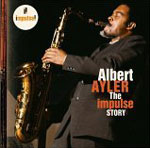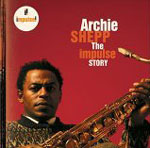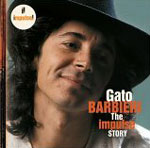Home » Jazz Articles » Multiple Reviews » Tenor Badness: Albert Ayler, Archie Shepp, Gato Barbieri
Tenor Badness: Albert Ayler, Archie Shepp, Gato Barbieri
Ayler omitted that other great Coltrane-sponsored Impulse! tenor saxophonist, Archie Shepp—there's only room for three in anyone's trinity—but Shepp might be described as Ayler's "brother." And if Gato Barbieri had been included in the Coltrane family tree, he'd be the "love child" (albeit one who took a wrong turn down the road).
These three compilation discs in Impulse!'s The House That Trane Built: The Story Of Impulse Records project join others from Pharoah Sanders and Coltrane himself to remind us what a powerhouse of wild tenors and paradigm-shifting innovations the label was in its mid-'60s through mid-'70s heyday.
 Albert Ayler
Albert Ayler
Albert Ayler: The Impulse Story
Impulse!
2006
Like Pharoah Sanders and Gato Barbieri, Albert Ayler came to Impulse! after first getting noticed on Bernard Stollman's minute but mighty ESP-Disk label. Four releases, Spiritual Unity and New York Eye And Ear Control in 1964, and Bells and Spirits Rejoice in 1965, announced the arrival of a revolutionary titan on a par with Charlie Parker, Ornette Coleman and John Coltrane. After Ayler, nothing sounded the same again.
Ayler had exploded onto the New York avant-garde scene in 1963, fully formed and practically out of nowhere (he'd been living in Europe), a shaman and mystic, deep in black music's traditions yet intent on rattling the cages and cleansing the stables. His song titles and public utterances often invoked religious imagery—which, like his music, was sometimes apocalyptic, sometimes ecstatic. (In these days of fascistic fundamentalist zealotry, religous imagery gives pause for caution; but Ayler's, like the Rastafarians' deification of Haile Selassie, was essentially metaphorical.)
This spectacularly beautiful anthology charts Ayler's Impulse! trajectory chronologically, from the various artists release The New Wave In Jazz in 1964 through The Last Album, recorded in 1969 and released after his death in 1970. The opening "Holy Ghost," a seven-minute fury of sound, jointly propelled by Ayler's screaming harmonics and drummer Sunny Murray's hammer of the gods, is solidly in Ayler's breakthrough ESP-Disk extended soloing groove. It still sounds like the second coming today.
Three years later, Ayler was experimenting with briefer, more tightly arranged performances, as represented here by two tracks from 1967's Love Cry, "Bells" and the title track. He moved into explicitly R&B territory with New Grass in 1968. Crucially, in both these phases, Ayler kept his tenor driving at compromise-free warp speed and maximum volume. Many observers nonetheless felt that New Grass in particular was beneath him. But listen to "Free At Last!" here. Who could fail to love the bar-walking, honking, holy roller tenor solo? Or the soul sisters wailing in the background? Junior Walker never sounded this good.
It's impossible to sum up Ayler's impact in a few words. Suffice to say, after first hearing Ayler, nothing sounds the same again. Anyone still to experience the revelation can make a great start with this album. Archie Shepp
Archie Shepp
Archie Shepp: The Impulse Story
Impulse!
2006
While Ayler, like a latter-day William Blake, used lysergic Christian imagery to foment a spiritual revolution, Archie Shepp took a more prosaic political line, aligning himself with America's radical counter-culture.
Shepp's profile as an angry firebrand—which he undoubtedly was—skewed perception of his music. His playing can be ecstatic and extreme, but at its core it's lush and lyrical. When not engaged in harmonics or priapic R&B exhortations, his sound is straight out of Ben Webster.
This album's opening track, Coltrane's "Naima," from 1964's Four For Trane, shows Shepp's freed-up Webster roots at their most caressing. Ellington's "Sophisticated Lady," from 1968's The Way Ahead, is another exquisite, recalibrated-Webster groove. Both tracks periodically break into rough-edged collective brawls, and both are irresistible.
Partner Shepp's depth of tone with dirty, barrelhouse funk—as on "Mama Too Tight," from the eponymous 1966 album, or "Damn If I Know (The Stroller)," from The Way Ahead—and you have something equally arresting. On tunes like these, Shepp loved to set his tenor alongside a roaring, tailgate trombone. A-listers Roswell Rudd, Joseph Orange and Grachan Moncur III are among those featured here.
Forty years on, Shepp's jazz and poetry performances stand up. "Malcolm, Malcolm-Semper Malcolm," from Fire Music, and "Scag," from New Thing At Newport, both recorded in 1965, still work. "Scag," though brief and unadorned, is reminiscent of the Last Poets' more rococo, contemporaneous classics "O.D.," "Jones Coming Down" or "Wake Up Niggers."
The album closes with the title track from Shepp's Sly Stone-meets-the New Thing album Attica Blues, made in 1972. Like Ayler's "Free At Last!," it's overt R&B, right down to the vocal trio. Even while protesting the massacre at the State Correctional Facility in Attica, New York, Shepp still shakes his booty.
Happily, Shepp is still very much with us, and he has a well put together and informative web site. Gato Barbieri
Gato Barbieri
Gato Barbieri: The Impulse Story
Impulse!
2006
Argentina-born Gato Barbieri promised much and—for a few years—delivered it. Those years were pretty much his mid '70s Impulse! period, after he'd cut his teeth at ESP-Disk and before he moved to A&M.
Barbieri was signed to Impulse! in 1972, hot from his success with the soundtrack for Last Tango In Paris. This selection of tracks from his four Impulse! albums—Chapter One (1973) through Chapter Four (1975)—sets his Pharoah Sander-ish, gently growling tenor alongside Argentinian and Brazilian folk musicians and settings. Taking in tango, samba and Andean Indian musics, it's pretty and sunny and easy on the ear, and at its best (Chapter One: Latin America and Chapter Two: Hasta Siempre, mostly recorded in Buenos Aires and Rio de Janeiro), the music recalls Sanders' Eastern-infused, emergent world jazz.
At A&M, Barbieri adopted a mellow, radio-friendly style, went for the beach house, the short and the pool, and slipped off the jazz radar for lengthy stretches. His Impulse! purple period is worth hearing again, although set against the Ayler or Shepp anthologies, it's lightweight and ephemeral stuff.
Tracks and Personnel
Albert Ayler: The Impulse Story
Tracks: Holy Ghost; Truth Is Marching In; Angels; Love Cry; Bells; New Grass/Message From Albert; Free At Last!; Music Is The Healing Force Of The Universe; Water Music; Untitled Duet.
Personnel: Track 1: Albert Ayler: tenor saxophone; Donald Ayler: trumpet; Joel Freedman: cello; Lewis Worrell: bass; Sunny Murray: drums. Track 2: Albert Ayler: tenor saxophone; Donald Ayler: trumpet; Michel Samson: violin; Bill Folwell, Henry Grimes: bass; Beaver Harris: drums. Track 3; Albert Ayler: tenor saxophone; probably Call Cobbs: piano; unknown: bass. Track 4: Albert Ayler: alto saxophone, vocal; Donald Ayler: trumpet; Alan Silva: bass; Milford Graves: drums. Track 5: Albert Ayler: tenor saxophone; Donald Ayler: trumpet; Alan Silva: bass; Milford Graves: drums. Track 6: Albert Ayler: tenor saxophone; Bill Folwell: electric bass/Albert Ayler: recitation; Burt Collins, Joe Newman: trumpet; Garnett Brown: trombone; Seldon Powell: flute; Buddy Lucas: baritone saxophone; Bill Folwell: electric bass; Bert DeCoteaux: arranger, conductor. Track 7: Albert Ayler: tenor saxophone, vocal; Burt Collins, Joe Newman: trumpet; Garnett Brown: trombone; Seldon Powell: flute; Buddy Lucas: baritone saxophone; Cal Cobbs: electric harpsichord; Bill Folwell: electric bass; Bernard Purdie: drums; Rose Marie McCoy, Mary Maria Parks: vocal; Bert DeCoteaux: arranger, conductor. Track 8: Albert Ayler: tenor saxophone; Bobby Few: piano; Bill Folwell, Stafford Jones: bass; Muhammad Ali: drums; Mary Maria Parks: vocal. Track 9: Albert Ayler: tenor saxophone; Bobby Few: piano; Bill Folwell, Stafford James: bass. Track 10: Albert Ayler: bagpipe chanter; Henry Vestine: electric guitar.
Archie Shepp: The Impulse Story
Tracks: Naima; Los Olvidados; The Girl From Ipanema; Malcolm, Malcolm-Semper Malcolm; Le Matin Des Noires; Scag; Mama Too Tight; Damn If I Know (The Stroller); Attica Blues.
Personnel: Track 1: Archie Shepp: tenor saxophone; Roswell Rudd: trombone; John Tchicai: alto saxophone; Reggie Workman: bass; Charles Moffett: drums. Track 2: Archie Shepp: tenor saxophone; Ted Curson: trumpet; Joseph Orange: trombone; Marion Brown: alto saxophone; Reggie Johnson: bass; Joe Chambers: drums. Track 3: Archie Shepp: tenor saxophone; Ted Curson: trumpet; Joseph Orange: trombone; Marion Brown: alto saxophone; Reggie Johnson: bass; Joe Chambers: drums. Track 4: Archie Shepp: tenor saxophone, recitation; David Izenzon: bass; J.C. Moses: drums. Track 5: Archie Shepp: tenor saxophone; Bobby Hutcherson: vibraphone; Barre Phillips: bass; Joe Chambers: drums. Track 6: Archie Shepp: recitation; Bobby Hutcherson: vibraphone; Barre Phillips: bass; Joe Chambers: drums. Track 7: Archie Shepp: tenor saxophone; Tommy Turrentine: trumpet; Grachan Moncur 111, Roswell Rudd: trombone; Howard Johnson: tuba; Perry Robinson: clarinet; Charlie Haden: bass; Beaver Harris: drums. Track 8: Archie Shepp: tenor saxophone; Jimmy Owens: trumpet; Grachan Moncur 111: trombone; Walter Davis Jr: piano; Ron Carter: bass; Beaver Harris: drums. Track 9: Archie Shepp: tenor saxophone; Ron Carter: bass: Roy Haynes: drums. Track 10: Archie Shepp: tenor saxophone; Clifford Thornton: cornet: Roy Burrowes, Charles McGhee, Michael Ridney: trumpet; Charles Greenlee, Charles Stephens, Kiane Zawadi: trombone; Hakim Jami: euphonium; Marion Brown, Clarence White: alto saxophone; Roland Alexander, Billy Robinson: tenor saxophone; James Ware: baritone saxophone; John Blake, Leroy Jenkins, Lakshinarayana Shankar: violin; Roland Lipscomb, Calo Scott: cello; Walter Davis Jr: electric piano; Cornell Dupree: electric guitar; Gerald Jemmott, Roland Wilson: electric bass; Ollie Anderson, Nene DeFense, Juma Sultan: percussion; Beaver Harris: drums: Joshie Armstead, Henry Hull, Albertine Robinson: vocal.
Gato Barbieri: The Impulse Story
Tracks: Nunca Mass; India; Encontros; Latino America; Gato Gato; Cuando Vuelva A Tu Lado (What A Difference A Day Makes); Viva Emiliana Zapata; El Sublime; Milonga Triste; To Be Continued.
Personnel: Track 1: Gato Barbieri: tenor saxophone; Osvaldo Bellingieri: piano; Dino Saluzzi: bandoneon; Adalberto Cevasco: electric bass. Track 2: Gato Barbieri: tenor saxophone; Raul Mercado: quena; Antonio Pantoja: quena, anapa, erke, siku, erkencho; Amadeo Monges: arpa India; Quelo Palacios: acoustic guitar; Adalberto Cevasco: electric bass; El Zurdo Roizner: percussion; Domingo Cura: bombo Indio. Track 3: Gato Barbieri: tenor saxophone; Daudeth De Azevado: cavaco; Helio Delmiro: electric guitar; Novelli: electric bass; percussion section of the Escola Do Samba Do Niterio: large and small surdo, tambourin, pandeiro, quica, agogo; Paulinho: drums; Mayuto Correa: congas, triangle; Jim Hughart: electric bass. Track 4: Gato Barbieri: tenor saxophone; Raul Mercado: quena; Antonio Pantoja: quena, anapa, erke, siku, erkencho, percussion; Amadeo Monges: arpa India; Quelo Palacios: acoustic guitar; Ricardo Lew: electric guitar; Adalberto Cevasco: electric bass; El Zurdo Roizner: percussion; Domingo Cura: bombo Indio. Track 5: Gato Barbieri: tenor saxophone; John Pisano: acoustic guitar; Lee Ritenour: electric guitar; Jim Hughart: electric bass; Mayuto Correa: percussion; Bob Zinitti: drums. Track 6: Gato Barbieri: tenor saxophone; Randy Brecker, Bob McCoy, Victor Paz: trumpet, flugelhorn; Buddy Morrow: trombone; Ray ALonge, Jimmy Buffington: French horn; Seldon Powell: flute; Howard Johnson: bass clarinet; Eddie Martinez: electric piano; George Davis: acoustic guitar; Ron Carter: electric bass; Ray Armando, Luis Mangual, Ray Mantilla, Portinho: percussion; Grady Tate: drums; Chico O'Farrill: arranger, conductor. Track 7: Gato Barbieri: tenor saxophone; Alan Rubin: trumpet, flugelhorn; Howard Johnson: flugelhorn, baritone saxophone; Buddy Morrow: trombone; Alan Raph: bass trombone; Ray Alonge, Jimmy Buffington: French horn; Seldon Powell: flute, alto and baritone saxophone; Eddie Martinez: piano; Ron Carter: electric bass; Ray Armando, Luis Mangual, Ray Mantilla, Portinho: percussion; Grady Tate: drums; Chico O'Farrill: arranger, conductor. Track 8: Gato Barbieri: tenor saxophone; Alan Rubin: trumpet, flugelhorn; Buddy Morrow: trombone; Alan Raph: bass trombone; Ray Alonge, Jimmy Buffington: French horn; Seldon Powell: flute, baritone saxophone; Eddie Martinez: electric piano; Ron Carter: electric bass; Ray Armando, Luis Mangual, Ray Mantilla, Portinho: percussion; Grady Tate: drums; Chico O'Farrill: arranger, conductor. Track 9: Gato Barbieri: tenor saxophone; Howard Johnson: bass clarinet; Eddie Martinez: electric piano; Paul Metzke: electric guitar; Ron Carter: electric bass; Ray Armando: percussion; Portinho: drums. Track 10: Gato Barbieri: tenor saxophone, narration; Daudeth De Azevado: cavaco; Helio Delmiro: electric guitar; Novelli: electric bass; percussion section of the Escola Do Samba Do Niteroi: large and small surdo, tambourin, pandeiro, quica, agogo; Paulinho: drums.
< Previous
Agents of Change
Next >
Guitar Therapy Live
Comments
Tags
For the Love of Jazz
 All About Jazz has been a pillar of jazz since 1995, championing it as an art form and, more importantly, supporting the musicians who create it. Our enduring commitment has made "AAJ" one of the most culturally important websites of its kind, read by hundreds of thousands of fans, musicians and industry figures every month.
All About Jazz has been a pillar of jazz since 1995, championing it as an art form and, more importantly, supporting the musicians who create it. Our enduring commitment has made "AAJ" one of the most culturally important websites of its kind, read by hundreds of thousands of fans, musicians and industry figures every month.


















